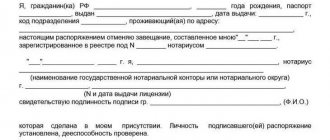Author of the article: Elena Petrenko Last modified: January 2021 15017
According to the law, citizens can inherit any property to both relatives and strangers. This right is regulated by Art. 1119 of the Civil Code of the Russian Federation. No one has the right to interfere with this, and a will for an apartment to a non-relative allows you to distribute shares in the property as the testator needs, while he can deprive family members of their inheritance if they are not allocated the obligatory part.
What is better to draw up: a deed of gift or a will for an apartment?
to transfer an apartment free of charge : by donation and by will. Both options have their advantages and disadvantages, and the choice in each specific case will depend on the circumstances.
The donation of an apartment and its will are transactions, and therefore they have much in common, for example, the requirement for written form. Despite this, both options have significant differences .
All property belonging to the testator at the time of death can be bequeathed, while only specific items or rights are allowed to be given. Also, a will is accepted on the “all or nothing” , i.e. either the heir accepts everything that is bequeathed or does not enter into the inheritance at all. A gift, on the other hand, is a bilateral transaction that expresses the agreement of both parties on the merits of the transaction.
Attention
The deed of gift cannot provide for counterclaims to the donee, because the gift is always free and unconditional. Whereas in a will it is possible to impose an obligation on the heir to accept the inheritance.
Pros and cons of a will
Like any other transaction, a will has both advantages and a number of disadvantages. The choice between it and a deed of gift is influenced by many factors. The advantages of a will include:
- Compiler's freedom . The testator has the right to distribute his property after death at his own discretion and deprive the right to inheritance without explaining his decision.
- Possibility to cancel or change a will at any time.
- Bequeathed property passes only after the death of the testator . As long as the testator is alive, the apartment belongs to him.
- Low cost of notarization.
- It is a fact that a will is the only way to dispose of property after your death.
- The ability to put forward conditions that must be fulfilled when accepting an inheritance.
However, like any other type of transaction, a will has its disadvantages:
- Only fully capable persons can make a will . These include adults and emancipated (i.e., minors, but recognized as capable) citizens.
- Freedom of will is limited by Art. 1149 of the Civil Code of the Russian Federation , which states that disabled children, parents and spouses are required to receive a share in the inheritance.
- Only one person can be a testator . The law currently does not allow the drawing up of joint wills.
- In any case, the heirs must pay a state fee to receive the inheritance . The gift is not subject to any duties or taxes if made between close relatives.
Information
From June 1, spouses will be able to draw up a joint will. Corresponding amendments are made by Art. 2 of Federal Law No. 217-FZ of July 19, 2018.
FAQ
Who will get the privatized apartment after the death of a relative?
Many citizens are interested in this aspect, probably believing that the free transfer of property to the former owner gives rise to special conditions of inheritance. This is not true. After the death of the owner, a privatized apartment is transferred to new owners in accordance with the general procedure.
However, persons who have refused privatization may apply for a privatized apartment. Housing legislation has assigned them the right to indefinite use of such real estate. Not being the owners, they can live in the apartment, even if the housing is privatized and transferred to another owner.
Important
This should be taken into account by apartment users who are just planning to register real estate as their own. To protect the heirs from an unwanted tenant, he must be evicted before the apartment is privatized.
Who will get the apartment after the death of the husband if it is in joint or shared ownership?
The wife's share is 50% of the joint apartment. 50% of the husband is divided among the heirs, including the spouse, in accordance with the general procedure. Inheritance occurs in a similar way in the case of shared ownership of real estate. The only difference is that the husband's share has already been determined and may be more or less than the wife's share.
How to find out if there is a will?
The procedure for drawing up a will requires maintaining the secrecy of the document until the death of the testator.
Therefore, without the desire of the owner, it is impossible to find out his last will during his lifetime.
After the death of the owner of the property, the will may be found in his documents and belongings. The notary's copy is kept by the specialist. You can obtain information about the document and the notary who executed the will by making a request to the regional notary chamber.
Where and how to make a will for an apartment
A will is written personally by the testator or a notary from his words. The Civil Code stipulates that the last will must be expressed in writing and certified by a notary.
The last will can be drawn up in free form, the main thing is that it accurately reflects the intentions of the testator - wills are interpreted literally, that is, in essence of what is written. Therefore, orders must be clear and avoid ambiguous interpretations.
Currently, a will can be written either by hand or on a computer. However, the typewritten method will be allowed until October 1, 2019, after which Article 3 of Law No. 34-FZ of March 18, 2019 will make appropriate changes to the Civil Code of the Russian Federation. Only handwritten wills will have force and legal significance .
In general, a will must be certified by a notary . Do not require notarization:
- Wills drawn up in emergency situations that threaten the life of the testator, provided that two witnesses were present when drawing up and signing.
- Testamentary dispositions in banks, which distribute money in the bank accounts of the testator among the heirs.
Important
A will, unlike other transactions, cannot be made by proxy - according to clause 3 of Art. 1118 of the Civil Code, the last will is drawn up personally by the testator or by a notary on his words.
Sample will for an apartment 2021
The law does not approve a strict sample will , however, there are general rules for drawing up a document that must contain:
- Date and place of execution of the will.
- Name, surname and patronymic of the testator, as well as his passport details.
- Place of residence of the testator.
- Information about the bequeathed property, showing what it is and where it is located.
- Information about the heirs under the will, including: their full name, address and, at the request of the testator, inherited shares.
- Personal signature of the testator.
- If the testator, due to serious illness, physical disabilities or illiteracy, is not able to sign the will, another person signs for him at the request of the testator (the executor). The reasons why the testator cannot sign are also indicated.
- Information about witnesses, if they were present during the drawing up and certification of the will, and their signatures.
- A note on the notary's explanation of the provisions of the Civil Code of the Russian Federation on the obligatory share in the inheritance.
- Information about certification of a will by a notary.
- A note confirming payment of the state duty or notary fee.
Sample will for an apartment
How to make a will between close relatives
, close relatives are first called to inherit , and then others. The heirs receive the property in equal shares. All inherited property in the absence of a will is inherited in turns , each of which is called upon only in the absence or refusal of the inheritance of the previous one. Close relatives make up the first two lines:
- husband, wife, parents and children;
- sisters and brothers, grandparents.
Therefore, if the testator wants to distribute his property after death in a different way - for example, to give an apartment to his sister, depriving his wife of inheritance - then he will have to write a will.
Attention
When entering into an inheritance, no tax is paid, but a fee is charged . Unlike a deed of gift, close relatives of the deceased are not exempt from payment.
A will for close relatives is drawn up in the same way as for everyone else . So, in general, a will contains:
- date and place of his imprisonment;
- information about the testator, heirs and witnesses (if any);
- information about bequeathed property;
- information regarding notarization and payment of fees.
What documents are needed for registration?
The only required document for drawing up and certifying a will is an identity card , because when performing a notarial act, the specialist must verify the identity of his client. As a rule, a passport plays this role , but the law allows the presentation of other documents that clearly confirm identity, for example, a military ID or a sailor’s passport.
fully capable persons can draw up a will ; therefore, if a will is drawn up by a minor, it is necessary to prove that he is fully capable and has the right to make a will. Capacity can be confirmed by:
- Marriage certificate, if the minor is recognized as having legal capacity as a result of marriage.
- The decision of the guardianship authorities or the court on emancipation.
For your information
Adult citizens are considered fully capable until their legal capacity is limited by a court decision.
No other documents, including documents for the apartment , are required.
According to Art. 57 of the Fundamentals of the Legislation of the Russian Federation on notaries, a notary, when certifying a will, has no right to demand from the testator evidence of rights to the bequeathed apartment.
If relatives are unhappy
A similar situation occurs often. The will remains a secret until it is revealed, and the relatives do not know that the inheritance has been assigned to others. When information is disclosed, a conflict of interest arises. In no case should you solve the problem with your throat or forceful methods. Extortion is a reason for declaring the successor unworthy and depriving the rights of inheritance.
The only way to get what you want is to enlist the help of a lawyer and challenge the will. They go to court at the place where the inheritance case was initiated. The statement of claim lists the arguments and provides evidence that the will was drawn up in gross violations of current legislation. However, there is another method when it is enough to contact a notary’s office with a written statement, if its author is a compulsory heir.
Who is entitled to the obligatory share?
To exercise this right in the presence of a will, it is necessary that the applicant is:
- A minor child of the testator. The interests of minors are defended by parents or guardians, since children do not have the right to sign legal documents.
- Disabled parent. Disability is confirmed by medical certificates, a disability certificate or a pension certificate.
- A dependent who is unable to work due to health reasons. It is important that the citizen is dependent on the testator for at least a year.
The property is also claimed by cohabitants who are not specified in the will, but used the living space and spent amounts commensurate with the minimum monthly payment for utilities. The tenant is required to pay for repairs and maintain the apartment or house in good condition with their own efforts and money.
Cost of registering a will for an apartment with a notary
The will, according to paragraph 1 of Art. 1124 of the Civil Code of the Russian Federation, must be certified by a notary or other official if he has the right to perform notarial acts or his certified will is equivalent to a notarized will. The latter include:
- Heads of local and municipal administrations and specially authorized persons, if there is no notary in the settlement or municipal area.
- Officials of Russian consulates.
- Chief doctors, their medical deputies or doctors on duty at hospitals, heads of hospitals, directors of nursing homes, if the testator is under their treatment.
- Captains of ships flying the Russian flag.
- Commanders of military units for wills of military personnel, and if there is no notary in the locality, then for civilian personnel.
- Heads of correctional institutions.
- Heads of expeditions, Antarctic stations and seasonal field bases.
When applying for certification of a will to a state notary office or to the heads of administrations, a state fee is paid . If the last will is certified by a private notary, then he charges a notarial fee equal to the state fee. According to paragraph 13 of Art. 333.24 of the Tax Code, the duty is 100 rubles.
Information
This fee applies to all types of wills, including closed ones.
When receiving an inheritance, no tax is paid , but you will have to pay a fee (or tariff) for issuing a certificate. The fee for issuing a certificate of inheritance depends on the value of the inherited property and on the family ties of the testator and heirs:
- 0.3% of the value of the inherited property, but not more than 100 thousand rubles, if the heir is the testator’s spouse, brother, sister, parent or child.
- 0.6% within 1 million, in other cases.
In addition, an additional fee of 300 rubles is established for opening and reading a closed will.
Is it possible to bequeath a mortgaged apartment?
As a rule, transactions with property that is pledged require the consent of the pledgee (bank), which is difficult to obtain. However, you can also bequeath an apartment that is under mortgage . Based on clause 2 of Art. 1119, the owner of the mortgaged property has the right not to notify the bank either about the contents of the will, or even about its existence.
Attention
The bank does not have the right to prohibit bequeathing an apartment that is under mortgage. Any restrictions violate the provisions of Part 3 of Art. 37 of the Federal Law “On Mortgage (Pledge of Real Estate)” and are void.
According to Art. 38 of the Mortgage Law, by accepting a mortgaged apartment, the heir assumes all the obligations of the testator to repay the mortgage loan. If the apartment was passed to several heirs, then the debt is divided between them in proportion to the shares in the inherited housing. If none of the heirs accepted the apartment, then it goes to the bank.
Transfer of different types of property
This procedure for transferring property by will applies regardless of the type of assets that are subject to distribution between the applicants. This could be a car, apartment, house, land and other types of property: the legal formalization of the procedure for transferring any property will not differ due to its nature.
As a rule, the main differences due to the type of property being transferred arise already at the stage of registration by the recipient of the rights to it. In particular, we are talking about a package of documents that must be provided to the notary to open an inheritance case and subsequently obtain a certificate of ownership of the inheritance. So, for example, if an apartment is inherited, you will need to provide title documents confirming the deceased’s ownership of it. This role may include a purchase and sale agreement, a privatization agreement, or other papers. In addition, you will need documents from the Technical Inventory Bureau: a certificate of the cost of housing, an explication and a floor plan of the building in which the apartment is located. The applicant may need an extract from the Unified State Register of Rights to Real Estate and Transactions with It, indicating the absence of encumbrances imposed on the residential property in question.
How to draw up a will for an apartment so that it is not challenged
Challenging a will is permitted only on the grounds set out in the current legislation . In particular, a will can be challenged if:
- the testator was not fully capable;
- the testator could not understand what was happening;
- the testator was deceived, intimidated or coerced into making the will;
- the will was not written by the testator himself or by a notary from the words of the testator;
- Several people will bequeath one document;
- the will is not certified by a notary.
If the will is drawn up according to the rules, then it will be difficult to challenge it . The first proof of its validity will be the notary who certified the last will. When contacting a specialist, the specialist is obliged to check the client’s legal capacity and his ability to adequately perceive what is happening.
For your information
In addition to him, witnesses who can be involved in drawing up, signing and certifying the will can also confirm the legality of the will.
It is also possible, when registering a last will, to obtain certificates from drug treatment and psychoneurological dispensaries , which indicate that the testator is not registered with them.









